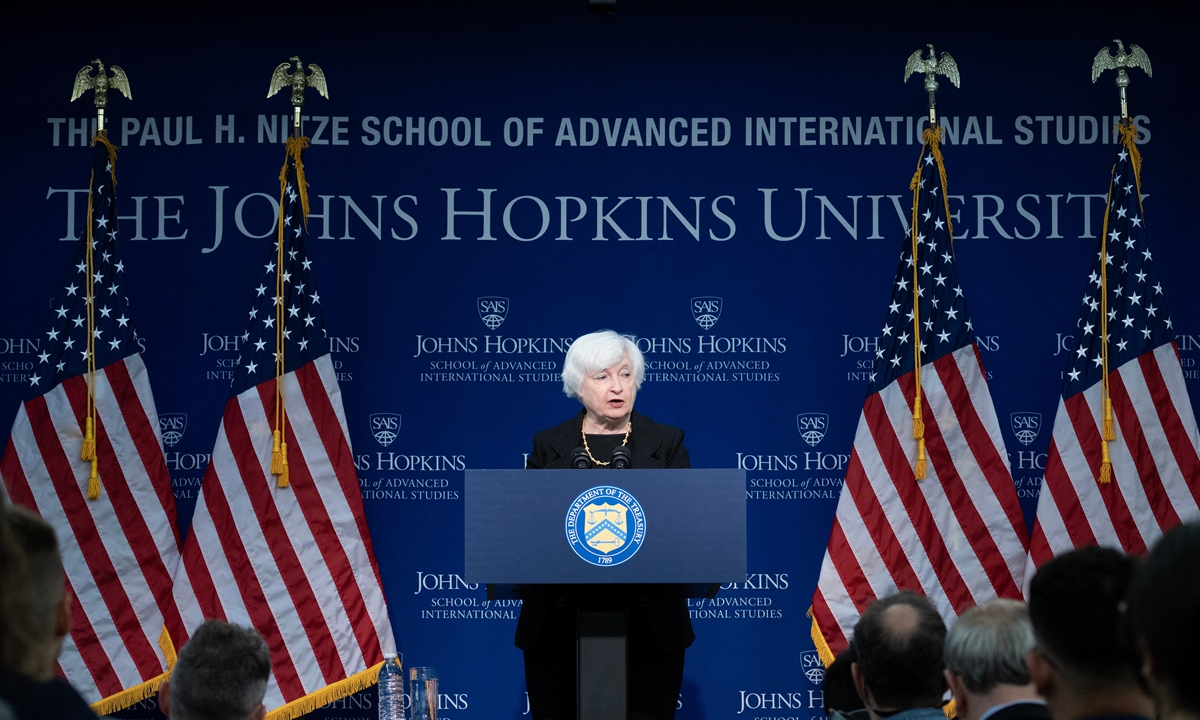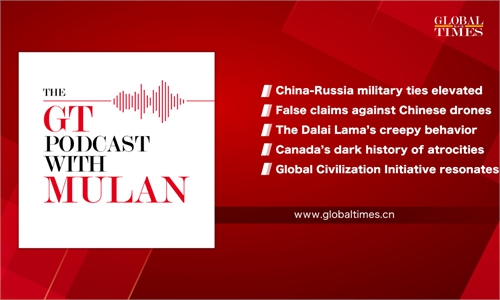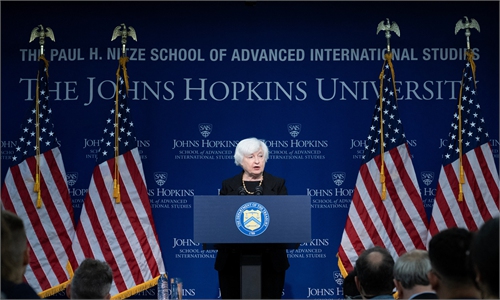Yellen’s remarks on China-US economic relations show US ‘saying one thing but doing another’: experts

US Treasury Secretary Janet Yellen speaks about the US-China economic relationship at Johns Hopkins University's School of Advanced International Studies in Washington, DC, on April 20, 2023. Photo: AFP
Chinese experts said that China welcomes and agrees to build a healthy, constructive and fair trade relationship with the US, but the US is being deceptive by "saying one thing but doing another," aiming to benefit from the economic cooperation with China while still catering to domestic politicians, commenting on remarks on the China-US economic relationship made by US Treasury Secretary Janet Yellen.
In the speech delivered at Johns Hopkins School of Advanced International Studies on Thursday local time, Yellen said that the US seeks a healthy, constructive and fair economic relationship with China. She also stressed that the US does not seek to "decouple" its economy from China's which would be "disastrous" for both countries.
The US "saying one thing but doing another" has become the norm in China-US economic exchanges, experts noted. From last year to now, several Biden administration officials have continued to express the US' willingness to ease tensions with China in words, but the country's actions have not changed, and the US' groundless suppression and containment on China have not changed.
Yellen also noted that the US will secure its national security interests with targeted actions despite economic impacts, while continuing to partner with allies to respond to China's "unfair" economic practices. For instance, she said that the US is considering a program to restrict certain US outbound investments in specific sensitive technologies with significant national security implications.
US President Joe Biden aims to sign an executive order in the coming weeks that will limit investment in key parts of China's economy such as chips, artificial intelligence and quantum by American businesses, Bloomberg reported on Thursday.
Responding to the US' move, Chinese Foreign Ministry spokesperson Wang Wenbin said at Friday's press briefing that the US real aim is to deprive China of its development rights and maintain its own hegemonic self-interest, which is "naked economic coercion and technological bullying" and will seriously disrupt the global industrial chain.
China opposes the generalization of the national security concept, especially implementing unwarranted containment and suppression without evidence on Chinese enterprises and individuals, Gao Lingyun, an expert at the Chinese Academy of Social Sciences in Beijing, said.
China agrees on pursuing a fair and constructive relationship with the US, but what the US called "unfair practices" by China cannot be recognized by the international community and organizations, especially the WTO, Gao told the Global Times on Friday, stressing that such allegations should be based on actual facts.
During Yellen's speech, she said that China's long-run growth rate seems likely to decline, while claiming that the US remains an "unparalleled leader" as the largest economy in the world.
Experts noted that rather than commenting on the challenges China may face, the US should focus on more effectively handling its domestic issues as the rest of the world faces headwinds and spillover ranging from its reckless interest rate hikes, rampant inflation and bank crisis.
China on Thursday urged the US and other developed countries to carefully assess the spillover impact of their economic and financial policies, stabilize market expectations in a timely manner, and avoid a negative impact on global financial stability.
The US government's internal divergence on decision-making for critical events will affect other countries, Gao noted, calling the US to adopt a responsible attitude as a major economy to properly handle issues like the Fed's rate hikes, while communicating with other countries ahead of time so as not to bring confusion to the market.
When speaking on debt distress for developing countries, Yellen said that China's participation served as a "roadblock" to necessary action.
Dong Shaopeng, a senior research fellow at the Chongyang Institute for Financial Studies at Renmin University of China, told the Global Times on Friday that such claim aims to trap China morally, adding that some US financial institutions have previously issued debt in other countries and the cost of debt repayment is high in the face of Fed's aggressive rate hikes.
Gao added that China's share in global debt and certain countries is not high, while the nation has been actively participating and supporting international initiatives linked to debt relief.


